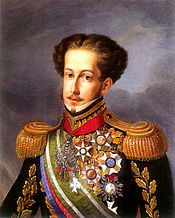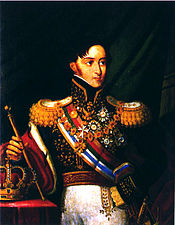- Liberal Wars
-
Liberal Wars Date 1828 to 1834 Location Portugal Result Liberal victory, Treaty of Evoramonte: - Constitutional Monarchy is restored
- Dom Miguel renounces all his claims to the throne and heads to exile
Belligerents  Liberals
Liberals
Supported by:
 United Kingdom
United Kingdom France
France Spain (Since 1834)
Spain (Since 1834)
 Miguelites
Miguelites
Supported by:
 Spain (Until 1833)
Spain (Until 1833)
Commanders and leaders  Dom Pedro
Dom Pedro
 Duke of Terceira
Duke of Terceira
 Marshal Saldanha
Marshal Saldanha Dom Miguel
Dom Miguel
 Viscount of Montalegre
Viscount of Montalegre
 Viscount of Santa Marta
Viscount of Santa MartaThe Liberal Wars, also known as the Portuguese Civil War, the War of the Two Brothers, or Miguelite War, was a war between progressive constitutionalists and authoritarian absolutists in Portugal over royal succession that lasted from 1828 to 1834. Embroiled parties included Portugal, Portuguese rebels, the United Kingdom, France, the Catholic Church and Spain.
Contents
Roots of the conflict
The death of King João VI in 1826 created a dispute over royal succession. The rightful heir to the throne was his eldest son, Dom Pedro, who was briefly made Dom Pedro IV. Neither the Portuguese nor the Brazilians wanted a unified monarchy; consequently, Pedro abdicated the Portuguese Crown in favor of his daughter, Dona Maria da Glória, a child of seven, on the condition that when of age she marry his brother, Miguel. In April 1826, as part of the succession settlement, Pedro revised the constitution granted in 1822, the first constitution of Portugal, and left the throne to Maria, with his sister Isabella Maria as regent.
A new constitution
In the Portuguese Constitutional Charter, Pedro attempted to reconcile absolutists and liberals by allowing both factions a role in the Government. Unlike the Constitution of 1822, this new document established four branches of the Government. The Legislature was divided into two chambers. The upper chamber, the Chamber of Peers, was composed of life and hereditary peers and clergy appointed by the king. The lower chamber, the Chamber of Deputies, was composed of 111 deputies elected to four-year terms by the indirect vote of local assemblies, which in turn were elected by a limited suffrage of male tax-paying property owners. Judicial power was exercised by the courts; executive power by the ministers of the Government; and moderative power by the King, who held an absolute veto over all legislation.
Discontent
The absolutist party of the landowners and the Church, however, were not satisfied with this compromise, and they continued to regard Miguel as the legitimate successor to the throne on the grounds that according to the Portuguese succession rules (approved by the Cortes after the 1640 Restoration), Pedro had lost the right to the Portuguese Crown, and therefore to choose a successor, when he took possession of a foreign crown (Brazil). They were alarmed by the liberal reforms that had been initiated in Spain by the detested Revolutionary French (reforms which the Portuguese feudal aristocracy had been spared) and took heart at the recent restoration of the autocratic Ferdinand VII in Spain (1823) who was eradicating all the Napoleonic innovations. In February 1828, Miguel returned to Portugal, ostensibly to take the oath of allegiance to the Charter and assume the regency. He was immediately proclaimed king by his supporters, who pressed him to return to absolutism. A month after his return, Miguel dissolved the Chamber of Deputies and the Chamber of Peers and, in May, summoned the traditional Cortes of the three estates of the realm to proclaim his accession to absolute power. The Cortes of 1828 assented to Miguel's wish, proclaiming him king as Miguel I of Portugal and nullifying the Constitutional Charter.
Rebellion
This alleged usurpation did not go unchallenged by the liberals. On May 18, the garrison in Porto, the center of Portuguese progressives, declared its loyalty to Pedro, to Maria da Glória, and the Constitutional Charter. The rebellion against the absolutists spread to other cities. Miguel suppressed these rebellions, and many thousands of liberals were either arrested or fled to Spain and Britain. There followed five years of repression.
Meanwhile, in Brazil, relations between Pedro and Brazil's agricultural magnates had become strained. In April 1831 Pedro abdicated in Brazil in favor of his son, Pedro II, and sailed for Britain. He organized a military expedition there and then went to the Azores, which were in the hands of the liberals, to set up a government in exile. In July 1832, with the backing of liberals in Spain and England an expedition led by Dom Pedro landed near Porto, which the Miguelites abandoned and where, after military activities including the Battle of Ponte Ferreira, Pedro and his associates were besieged by Miguelite forces for nearly a year. To protect British interests, a naval squadron under Commander William Glascock in HMS Orestes was stationed in the Douro, where it came under fire from both sides.
In June 1833, the liberals, still encircled at Porto, sent to the Algarve a force commanded by the Duke of Terceira supported by a naval squadron commanded by Charles Napier, using the alias 'Carlos de Ponza'. Terceira landed at Faro and marched north through the Alentejo to capture Lisbon on July 24. Meanwhile Napier's squadron encountered the absolutists' fleet near Cape Saint Vincent (Cabo São Vincente) and decisively defeated it at the fourth Battle of Cape St. Vincent. The liberals were able to occupy Lisbon, where Pedro moved from Porto and repulsed a Miguelite siege. A stalemate of nine months ensued. Towards the end of 1833 Maria da Glória was proclaimed Queen, and Dom Pedro was made Regent. His first act was to confiscate the property of all who had served under Dom Miguel. He also suppressed all religious houses and confiscated their property, an act that suspended friendly relations with Rome for nearly eight years, until mid-1841. The absolutists controlled the rural areas, where they were supported by the aristocracy, and by a peasantry that was galvanized by the Church. The liberals occupied Portugal's major cities, Lisbon and Porto, where they commanded a sizeable following among the middle classes. Operations against the Miguelites began again in earnest in early 1834. Meanwhile, the liberal army had suffered a sound defeat at Alcácer do Sal, which proved that, despite the Duke of Terceira's recent march from Faro to Lisbon, the South was still loyal to the Miguelites.
Peace
The Battle of Asseiceira, fought on May 16, 1834, was the last and decisive engagement of the Portuguese Civil War. The Migueliste army was still formidable (about 18,000 men), but on May 24, 1834, at Évora-Monte, a peace was declared under a convention by which Dom Miguel formally renounced all claims to the throne of Portugal, was guaranteed an annual pension, and was definitively exiled. Dom Pedro restored the Constitutional Charter, but he died September 24, 1834.
Maria da Glória resumed her interrupted reign as Maria II of Portugal.
References
 This article incorporates public domain material from websites or documents of the Library of Congress Country Studies.
This article incorporates public domain material from websites or documents of the Library of Congress Country Studies.
Categories:- 1820s conflicts
- 1830s conflicts
- Wars involving France
- Wars involving Portugal
- Wars involving Spain
- Wars involving the United Kingdom
- Wars of succession
- History of Portugal
- 19th century in Portugal
- Civil wars involving the states and peoples of Europe
Wikimedia Foundation. 2010.



